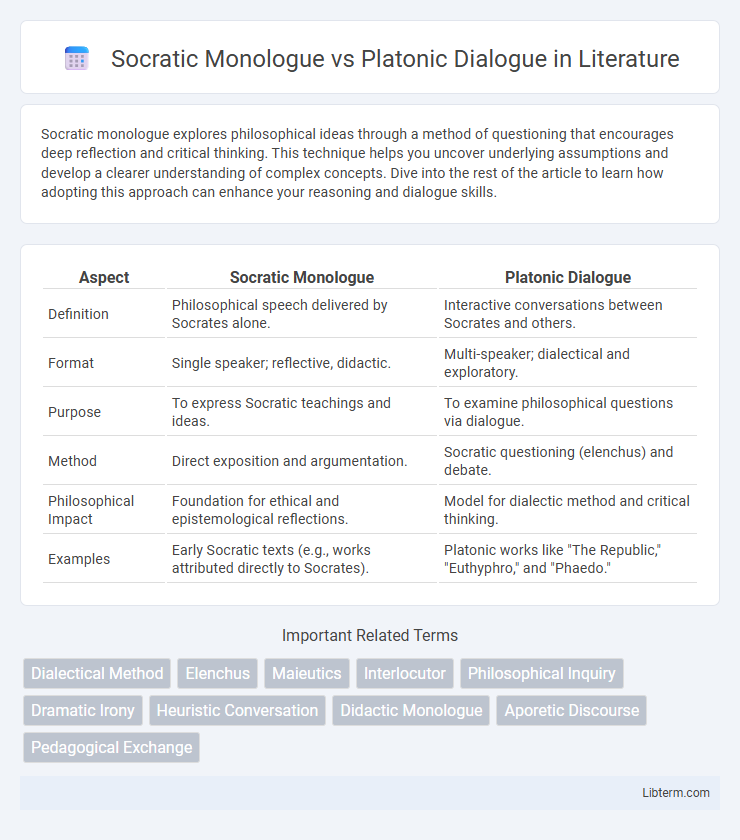Socratic monologue explores philosophical ideas through a method of questioning that encourages deep reflection and critical thinking. This technique helps you uncover underlying assumptions and develop a clearer understanding of complex concepts. Dive into the rest of the article to learn how adopting this approach can enhance your reasoning and dialogue skills.
Table of Comparison
| Aspect | Socratic Monologue | Platonic Dialogue |
|---|---|---|
| Definition | Philosophical speech delivered by Socrates alone. | Interactive conversations between Socrates and others. |
| Format | Single speaker; reflective, didactic. | Multi-speaker; dialectical and exploratory. |
| Purpose | To express Socratic teachings and ideas. | To examine philosophical questions via dialogue. |
| Method | Direct exposition and argumentation. | Socratic questioning (elenchus) and debate. |
| Philosophical Impact | Foundation for ethical and epistemological reflections. | Model for dialectic method and critical thinking. |
| Examples | Early Socratic texts (e.g., works attributed directly to Socrates). | Platonic works like "The Republic," "Euthyphro," and "Phaedo." |
Introduction to Socratic Monologue and Platonic Dialogue
Socratic Monologue presents philosophical ideas through a single speaker, typically Socrates, exploring concepts deeply and methodically to provoke critical thinking. Platonic Dialogue features multiple participants engaging in questions and answers, allowing diverse perspectives to emerge and leading to collaborative reasoning. Both methods serve as foundational tools in Western philosophy for examining ethics, knowledge, and truth by emphasizing dialectical inquiry and reflective thought.
Historical Context: Socrates and Plato
Socratic monologue primarily refers to Socrates' method of ethical inquiry through persistent questioning aimed at uncovering underlying beliefs, practiced during the 5th century BCE in Athens. Plato, his student, transformed these oral dialectical techniques into written Platonic dialogues, embedding Socratic inquiry within structured conversations featuring Socrates and other interlocutors. This shift reflects the historical transition from oral teaching to literary philosophy in Classical Greece, preserving Socratic thought and expanding it through Platonic metaphysical ideas.
Defining Socratic Monologue
Socratic Monologue is a method where Socrates engages in a one-sided philosophical discourse to explore ethical concepts and elicit critical thinking through probing questions. Unlike Platonic Dialogue, which features multiple interlocutors collaboratively examining ideas, Socratic Monologue emphasizes a solitary inquiry driven by Socrates' dialectical questioning. This form highlights the pursuit of self-knowledge and truth by challenging assumptions within a structured, reflective monologue.
Understanding Platonic Dialogue
Platonic Dialogue is a philosophical method rooted in structured conversations where ideas are explored collaboratively through questioning and answering, fostering deeper understanding. Unlike the Socratic Monologue, which centers on a single perspective, Platonic Dialogue engages multiple viewpoints, allowing participants to refine beliefs and uncover contradictions. This dynamic interaction enhances critical thinking and drives philosophical inquiry beyond individual reflection.
Structural Differences Between the Two Forms
Socratic monologues typically involve a single speaker, Socrates, leading a structured inquiry through a series of questions aimed at eliciting knowledge or exposing ignorance, emphasizing introspective reflection. In contrast, Platonic dialogues feature multiple interlocutors engaging in dynamic discussions, allowing diverse viewpoints and dialectical exchanges that unfold collaboratively. The structural difference lies in monologues' linear progression of thought versus dialogues' interactive format fostering polyphonic argumentation and deeper philosophical exploration.
Philosophical Objectives Compared
Socratic monologues emphasize self-examination and the pursuit of ethical truths through questioning, aiming to stimulate individual insight and moral clarity. Platonic dialogues, structured as interactive discussions, seek to uncover deeper metaphysical and epistemological realities by exploring multiple perspectives collaboratively. The philosophical objective of Socratic monologue centers on personal intellectual development, whereas Platonic dialogue aims to advance collective understanding and the formulation of philosophical theories.
Role of Interlocutors and Audience
In Socratic Monologue, the interlocutor primarily serves as a passive respondent, allowing the philosopher to lead the inquiry and guide the audience through a structured exploration of ideas. Platonic Dialogue involves multiple interlocutors actively engaging in dialectical exchanges, fostering a dynamic interplay of perspectives that challenges assumptions and refines arguments. The audience in Platonic Dialogue participates indirectly by observing these interactions, which encourages critical thinking and deeper understanding through the contrasting viewpoints presented.
Impact on Philosophical Method and Inquiry
Socratic monologue centers on self-questioning and internal reflection, emphasizing dialectical reasoning to stimulate critical thinking and uncover assumptions within a singular voice. Platonic dialogue introduces multiple perspectives through conversational exchange, fostering collaborative inquiry and allowing the exploration of complex ideas via argumentative interplay. The impact on philosophical method lies in Socratic monologue's inward analytical depth contrasted with Platonic dialogue's dynamic, dialectical development of knowledge through interpersonal engagement.
Relevance to Modern Discourse and Pedagogy
Socratic Monologue emphasizes a single speaker's dialectical reasoning, fostering deep individual critical thinking skills, while Platonic Dialogue engages multiple interlocutors in dynamic exchange, promoting collaborative learning and diverse perspectives. Modern discourse benefits from Platonic Dialogue by encouraging open-ended inquiry and mutual understanding, essential in diverse educational and professional settings. Pedagogically, integrating Socratic Monologue strengthens analytical rigor, whereas Platonic Dialogue enhances communicative competence and adaptability in complex problem-solving.
Conclusion: Lasting Influence on Western Thought
Socratic monologues emphasize individual introspection and self-knowledge, forming the foundation for ethical philosophy in Western thought. Platonic dialogues introduce a dynamic method of exploring truth through dialectical reasoning, influencing the development of critical thinking and pedagogical techniques. Together, these approaches have profoundly shaped philosophical inquiry, promoting rigorous debate and reflective understanding in the Western intellectual tradition.
Socratic Monologue Infographic

 libterm.com
libterm.com